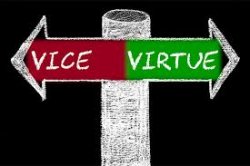And, IME, the godless have every bit as much virtue as any so-called 'godly'
Let me quote from a Baha'i source what is "ungodly":
M E M O R A N D U M
To: The Universal House of Justice
Date: 10 September 2001
From: Research Department
Definition of the Word "Ungodly"
In their letter dated 1 June 2001 to the Universal House of Justice, Miss … and Miss … enquire about the meaning of the word "ungodly" as it is used in the following passage from the Hidden Words, and more generally in the Bahá'í Writings:
O Son of Dust!
Beware! Walk not with the ungodly and seek not fellowship with him, for such companionship turneth the radiance of the heart into infernal fire.1
Specifically, Miss … and Miss … seek clarification concerning "who and what is considered ‘ungodly'". The Research Department has studied these issues, and we provide the following comments.
By way of introduction, we wish to note that the Research Department has not, to date, been able to locate in the Writings of the Faith either an authoritative interpretation of the verse cited above, or a detailed definition of the Bahá'í concept of "ungodliness". We note, however, that Bahá'u'lláh appears to link the decline of religion to the rise in the influence of the "ungodly". He states, for example:
Religion is verily the chief instrument for the establishment of order in the world and of tranquillity amongst its peoples. The weakening of the pillars of religion hath strengthened the foolish and emboldened them and made them more arrogant. Verily I say: The greater the decline of religion, the more grievous the waywardness of the ungodly. This cannot but lead in the end to chaos and confusion.
The Universal House of Justice in a letter dated 10 March 1983 written on its behalf to an individual believer seeking a definition of "ungodliness" relates the concept of "ungodliness" to the Persian Hidden Words number 3 and quotes Shoghi Effendi's interpretation of this particular verse:
In response to your letter received on 6 March seeking from the Universal House of Justice a definition of "ungodliness", we have been directed to quote the following passage found on page 200 of "Dawn of a New Day", a compilation of letters written on behalf of the beloved Guardian to the National Spiritual Assembly of the Bahá'ís of India:
In the passage "eschew all fellowship with the ungodly", Bahá'u'lláh means that we should shun the company of those who disbelieve in God and are wayward. The word "ungodly" is a reference to such perverse people.
With reference to Shoghi Effendi's clarification quoted above, it may also be helpful to note that dictionary definitions of "wayward" include "childishly self-willed or perverse, capricious" and "unaccountable"; and the definition of "perverse" includes "stubbornly departing from what is reasonable", "persistent in error", "perverted" and "wicked". In the context of the Persian Hidden Words, number 3, then, the phrase "ungodly" apparently refers to a broad range of behaviors including those associated with Covenant-breaking.
Regarding a criteria for determining "who and what is considered ‘ungodly'", Miss … and Miss … are encouraged to reach their own understanding based on the guidance in the verses from the Hidden Words and other statements in the Writings of the Faith. To assist them in thinking about this issue, we provide, below, the following extract from a letter dated 5 April 1995 written on behalf of the Universal House of Justice to an individual believer:
… in choosing one's close companions, one is advised that one should not include among them those individuals who are "ungodly"—that is to say whose attitudes and lives are directed in a way that is contrary to God and His Teachings—or, as indicated in the Kitáb-i-Íqán, those people who are boastful and worldly.
Sorry, this is harder to understand outside a Baha'i context. In other words to me word "ungodly" is hard to define. This does not deny that atheists can have virtues in my view. The words "disbelieve in god" are not really addressed directly, but in light of the further words "and are wayward" this casts a different light on those words, as does also the words "boastful and worldly" This reference is from this:
He should treasure the companionship of them that have renounced the world, and regard avoidance of boastful and worldly people a precious benefit.
(Baha'u'llah, Gleanings from the Writings of Baha'u'llah, p. 265)
This is the equivalent to this to me:
Treasure the companionship of the righteous and eschew all fellowship with the ungodly.
(Baha'u'llah, The Persian Hidden Words)

